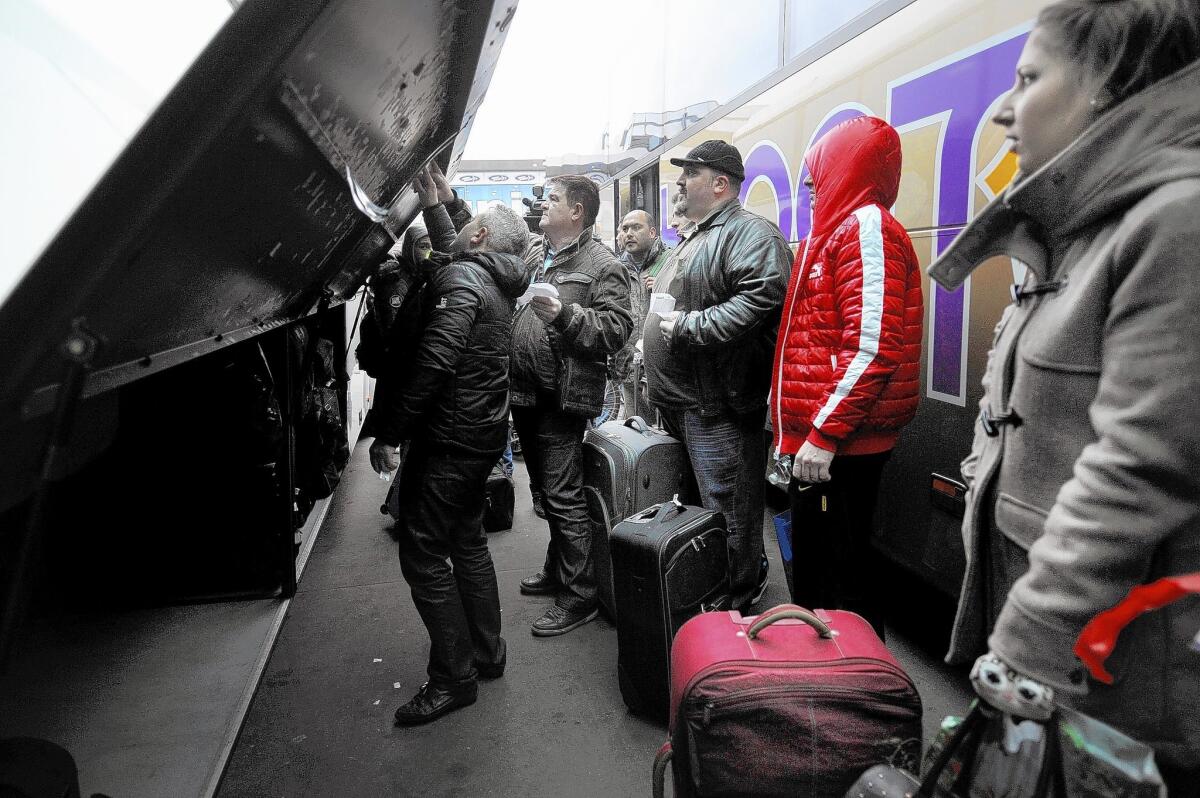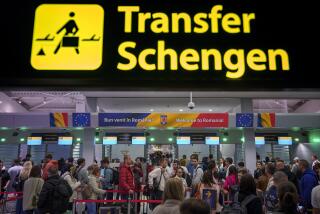As EU doors open, Bulgarian and Romanian migrants see minds closing

BERLIN — The last time she checked, Katya Tasheva had the normal number of limbs and eyes. So she feels a nasty shock of non-recognition, she says, when German news reports warn of a coming invasion of people like her — Bulgarians — as if they were aliens from space.
“It’s all of a sudden like we’re these three-eyed, five-legged people who are all going to steal stuff,” said Tasheva, 27, a singer who has lived in Berlin for nine years. “Normally when I listen to these comments, I just laugh and switch the channel or turn the page…. But it does make me a bit angry.”
Her homeland and neighboring Romania are among the most recent countries to have joined the 28-nation European Union. Both won admission in 2007, part of the EU’s ambitious drive to knit together the whole of a once-war-torn continent.
But now, citizens of the two former Soviet satellites are putting one of the EU’s founding principles to the test.
Since Jan. 1, they’ve had the right to live and work as they please in any member country, from Ireland to Italy. Probationary restrictions were lifted, giving way to the unfettered movement enshrined in EU law for its half-billion residents.
Yet granting them the same rights as other EU citizens has exposed just how deeply the project of European unity has frayed in the wake of a debilitating debt crisis and prolonged recession. A wave of anti-immigrant sentiment is sweeping the region, with critics in richer nations looking for ways to put walls back up.
Right-wing political parties calling for migration controls have gained ground from France to Finland. Groups that used to focus on turning back Muslims from faraway lands are now seeking to block fellow Europeans from settling in their countries, in spite of EU regulations. They scored a major victory last month when voters in Switzerland — which, though not an EU member, had accepted its rules on freedom of movement — narrowly approved a referendum to end that arrangement.
To the dismay of Romanians and Bulgarians, much of the unease and tension over immigration has focused on them, in part because their countries are among the EU’s poorest. Anti-immigrant campaigners in Britain and Germany have fanned fears of a flood of Bulgarians and Romanians sponging off their welfare systems.
It’s a characterization that stings.
“They all think we’re really people who are hopeless and that we came here out of desperation just to take advantage of social services. I don’t know people like that,” said Maria Duness-Rose, 38, a Bulgarian restaurateur in Berlin who proudly serves up food and wine from her native land. “It breaks my heart.”
The controversy took an emotionally charged turn when a usually low-profile politician from Germany’s ruling Christian Democratic party suggested that foreign welfare abusers be deported and fingerprinted to prevent them from re-entering the country. Romanian Prime Minister Victor Ponta lashed back by accusing the politician of having a Nazi mind-set.
The right-wing press in Germany, especially its tabloids, has helped harden public attitudes by popularizing a newly coined word for the feared influx of opportunistic welfare seekers: armutseinwanderung, or “poverty migration.” (In Britain, the equivalent is “benefit tourism.”)
Not only is it an “ugly term” that should not be used, said German sociologist Ludger Pries, it also paints a false picture, he and others say.
Since the last barriers to the movement of Romanians and Bulgarians within the EU were dropped, there’s been no evidence of a sudden rush of new arrivals. Moreover, among those allowed into Germany in limited numbers from 2000 through 2010, the unemployment rate was no greater than the overall German jobless rate. About 30% of the migrants boast an academic or vocational degree, higher than the German average, Pries said.
A number of Romanians and Bulgarians work in Germany’s healthcare industry, earning more as doctors and nurses here than they would back home. And they help fill the gaps left by the German physicians who’ve moved to Switzerland to take higher-paying jobs, immigration experts say.
“The message for me is there’s no significant exploitation of the social welfare system by Romanian or Bulgarian immigrants,” said Pries, deputy chairman of the Expert Council of German Foundations on Integration and Migration. “In general, [apart from] specific local problems, they are performing quite well in the labor market.”
In Britain, where “Euroskeptic” lawmakers are pressuring Prime Minister David Cameron to impose quotas on Bulgarians and Romanians in contravention of EU law, the experience has been similar.
On New Year’s Day, swarms of British reporters waited at airports for planeloads of new migrants from Bucharest and Sofia eager to settle in rainy, flood-stricken Britain and start claiming welfare checks. The hordes didn’t materialize.
Cameron, who has taken a tough line on immigration to outflank a surging anti-EU party and to appease many of his Conservative backbenchers, acknowledged recently that the number of newcomers from Romania and Bulgaria was at “a reasonable level.”
Some experts contend that hostility toward migrants from those countries is fueled partly by a misunderstanding and a barely concealed bigotry.
They say that many people equate Romanians and Bulgarians with Roma, the often nomadic peoples who are also called Gypsies and are widely stereotyped as beggars, thieves or worse. Although Romania and Bulgaria do have Roma populations, such communities are found across Europe.
When German officials warned of a tide of poor welfare cheats from Bulgaria and Romania, “I am absolutely sure they were talking about Roma,” said Mona Vintila, who works with a charity in Berlin that provides legal and other aid to immigrants from southeastern Europe. “This is what makes me angry and where I get emotional, because this is racism.”
Discrimination against Roma comes freighted with extra significance in Germany, which under the Nazis shipped tens, perhaps hundreds, of thousands of Roma to die in concentration and extermination camps because of their non-Aryan blood.
Media reports have highlighted cities, such as Duisburg and Dortmund in western Germany, that have become magnets in recent years for Roma, including some from Bulgaria and Romania, even before the remaining restrictions on movement within the EU were abolished. In November, 16 mayors appealed in a letter to the federal government for more funds to deal with poor Bulgarian and Romanian migrants who did not observe “the conventions of neighborly coexistence” and had strained their budgets with claims on public housing and other assistance.
Peter Kurz, one of the letter’s signatories, said his city, Mannheim, is now home to 7,000 Romanians and Bulgarians, out of a population of 300,000. (There are also 28,000 Turks and 18,000 Poles.)
In Germany as a whole, there are about 368,000 Bulgarians and Romanians out of a population of about 80 million.
“On probability, most people in Mannheim know the fact of migration by Bulgarians and Romanians through the media and not through their own experience,” Kurz said. “On the other hand, we have to stabilize the neighborhoods; we have to cope with the situation.”
Vintila, 31, who is Romanian but not a Roma, acknowledges that there have been problems in some parts of Germany. But to tar all Roma with the same brush, and to extrapolate that to all Romanians and Bulgarians, would be wrong, she says.
“You have the beggars, you have the criminals, you have the normal people wanting a better life, and you have the super-qualified who get jobs like that,” Vintila said, snapping her fingers. “You have all kinds of people. So let’s talk about that. Let’s go deeper.”
In the edgy Berlin district of Neukoelln, a receiving point for immigrants for centuries, vandals have poured foul-smelling oil into the stairwell of a Roma-occupied apartment building five times in the last three years, said Arnold Mengelkoch, the local government migration officer. Other residents have complained that such publicly subsidized housing is too nice for Roma.
“You can’t only say you want [people from] the rich countries of Europe,” Mengelkoch said. “This is a united Europe.”
Bulgarians and Romanians remind their fellow EU members that the flow of people and trade isn’t one-way. After the two countries entered the EU in 2007, European companies flocked to them to tap the markets and build factories staffed by cheaper labor.
“Germany profited most from that. If you look at the map, the leading companies in Bulgaria are all German,” said Tamara Atanasova, 30, who moved to Berlin from Sofia, the Bulgarian capital, as a student in 2002.
Although she doesn’t like the comments she hears about undesirable Bulgarian and Romanian migrants, she tries not to take it personally. The same thing happened to Poles who came here, Atanasova said, and then Spaniards and Italians when their economies soured.
“Of course there are people who want to live here, who want to live better,” she said. “The Germans and English are surprised that we’re coming. Why? It’s the most natural thing in the world.”
latimes.com”>henry.chu@latimes.comhenry.chu@latimes.com”>henry.chu@latimes.comlatimes.com”>henry.chu@latimes.com
More to Read
Start your day right
Sign up for Essential California for news, features and recommendations from the L.A. Times and beyond in your inbox six days a week.
You may occasionally receive promotional content from the Los Angeles Times.







